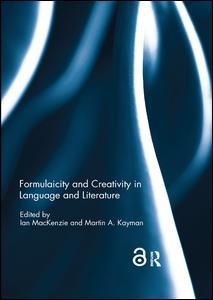Formulaicity and Creativity in Language and Literature
Coordonnateurs : MacKenzie Ian, Kayman Martin A.

The chapters in this book elucidate the nature of semi-fixed formulaic sequences; how the meaning of formulaic expressions can change over time; how readers interpret formulaic expressions in first and second languages; how modern and postmodern authors use traditional genres and tales to challenging effect; and how formulaic patterns involving particular words can underlie the texture and meanings of entire novels. Together, the contributions to this collection provide a convincing reassessment of the potential creativity of the formulaic in a variety of linguistic and literary contexts. This book was originally published as a special issue of the European Journal of English Studies.
Chapter 1 of this book is freely available as a downloadable Open Access PDF at http://www.taylorfrancis.com under a Creative Commons Attribution-Non Commercial-No Derivatives (CC-BY-NC-ND) 4.0 license.
Introduction: Formulaicity and creativity in language and literature1. Formulaic sequences: a drop in the ocean of constructions or something more significant?2. Begging the question: chunking, compositionality and language change3. How native and non-native speakers of English interpret unfamiliar formulaic sequences4. Rewriting the fairy tale in Louise Murphy’s and Lisa Goldstein’s Holocaust narratives5. Transforming the pantomime formula in J.M. Barrie’s Peter Pan 6. ‘The Hollow Echo’: Gothic fiction and the structure of a formulaic pattern
Ian MacKenzie recently retired from the Faculty of Translation and Interpreting at the University of Geneva, Switzerland. His research largely concerns the role and nature of English as an international language.
Martin A. Kayman is a former Head of the School of English, Communication and Philosophy at Cardiff University, UK, and a general editor of the European Journal of English Studies. He researches and publishes on law and literature, and on the cultural politics of English as a global language.
Date de parution : 02-2019
17.4x24.6 cm
Date de parution : 07-2017
17.4x24.6 cm
Thème de Formulaicity and Creativity in Language and Literature :
Mots-clés :
Young Men; European Journal of English Studies; Perpetrator Figure; language change; Iron Claw; intertextuality; Widow Twankey; prefabricated language; Elana Gomel; spoken language; Vice Versa; language comprehension; Fairy Tale; literary rewritings; FSs; creativity; Semantic Prosody; formulaicity; Formulaic Pattern; Martin A; Kayman; Multi-word Terms; Andreas Buerki; Tinker Bell; Carol Lynn Moder; Coca Corpus; Alison Wray; Peter Pan; Huw Bell; Pantomime Tradition; Katy Jones; Principal Boy; María Jesús Martínez-Alfaro; Co-occurrence Relations; Kirsten Stirling; Fairy Tale Genre; Manuel Aguirre; Barrie’s Peter Pan; Word Form; Non-native Speakers; Stock Characters; Lf; Semantic Unity



